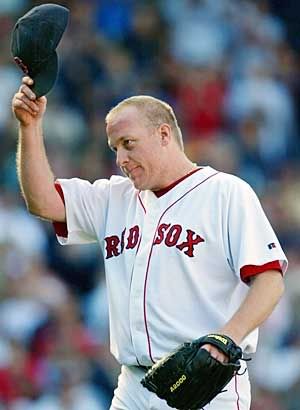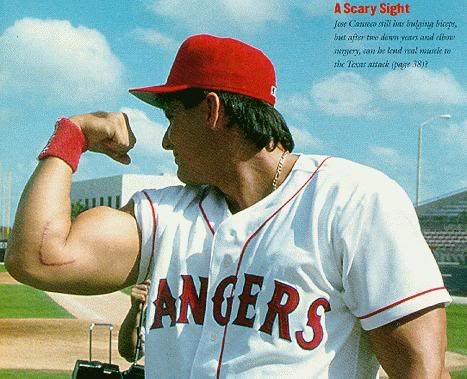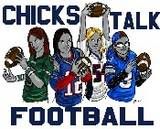Stand-Up Guy

This discussion was prompted by Beth’s question on the SGMB about why people are so quick to criticize Curt Schilling for being outspoken. When my friend Jen emailed me and asked me what I thought of the whole steroids Congressional hearings issue and what I thought of Schilling’s apparent willingness to participate, I replied with the same response.
Kristen: (On Schilling):
I find that (his outspokenness) exceptionally refreshing about him too. I don't always agree with everything he says, in fact, I vehemently disagree with a lot of what he has to say, but I love like crazy the fact that he's not afraid to say it. Oftentimes athletes or celebrities are afraid to say anything too inflammatory, even if it's what they really think, because they don't want to risk losing popularity. Because of that, they become devoid of any personality and they start issuing the mundane, stock "one game at a time" quotes. You have to respect people like Schilling and Millar who just say what they think. You'd think that if anyone can appreciate someone who is opinionated, it'd be New Englanders. But
Jen:
One disappointing feature of the hearing, (the parts I heard anyway), was each player’s reluctance to go out on a limb and say they would take action if they personally knew about drug use by a teammate. They are all so very willing to let the government go above the league leaders and crack down criminally on the matter, but don’t have the cajones to say they would address it one on one? It’s a thin line to walk, no doubt, and turncoats and squealers are not well-regarded generally, (not to mention the contradictions this raises among these self-proclaimed "team players"), but being outspoken against an issue has its compromises. One senator put it interestingly when he asked them what they thought their duty was. (Schilling, in a warm-hearted yet off-point remark cited god and family first above all else....) Anyway, your thoughts?
Kristen:
Well, it's like I said, I disagree with a lot of what Schilling has to say, but I appreciate his willingness to say it. The whole "I'm a big ole' Christian Republican" business gives me the ibbies but hell, he can damn well be what he wants. What concerns me is the McCarthyism aspect of the whole thing in that I hope they don't expect players to name names or implicate teammates. I do not think that baseball players - or any athletes or celebrities - should be above the law but I do understand that there is a brotherhood of sorts that exists in those clubhouses that is - if the recent run of Red Sox success means anything - incredibly important to the game. I am, however, glad that there is a "Task Force" (which sounds incredibly comic book, Captain

Jen:
That’s what I’m saying! Like, if you REALLY care, you will confront Mr. Needle Third Baseman (or whomever) and not have to have Big Brother take over for you. I don’t believe they were looking for, nor did they get names, it was more of a "Let’s assess the failings here and think about how to fix the broken system." Less witch hunt and more bureaucratic do-gooderness.
I tend to agree that certain drug use (such as the widespread scourge of heroin among the young) is possibly a more pertinent problem for the Senate to address.
I tend to think that baseball players need to recognize that playing is a goddamn privilege and if you can’t do it au natural then buh-bye. Period. One strike and you’re out kind of thing. Maybe it’s harsh but why should we be more forgiving than that? They are performance enhancers...it’s embarrassing.

Kristen:
Exactly. And I love fiercely the fact that Schilling wasn't afraid to rail against Canseco by calling him a "so-called" author, (the hopeful writer in me giggles helplessly at that), and denounce his book as unreadable. Schill has said this before, in chat rooms and interviews and what have you so it's not like he just came up with that yesterday. It's also a bit shocking, though sadly so, to see the marked contrast between someone like Schilling who is, for all intents and purposes, extremely eloquent and well-spoken and someone like Canseco who can barely utter a sentence. I've always been highly disturbed by the apparent lack on intelligence on the part of professional athletes (which is part of my problem with kids being allowed to enter the pros right out of high school but that's a whole different issue) and it's refreshing to see someone intelligent actually use their intellect for a good purpose.
What's embarrassing, and what Schilling addressed rather well, I think, is the effect this has on youth. Because of, as I mentioned, the possibility of high school athletes turning pro, steroids has become an even bigger problem. It's the whole role model issue. You are one, whether you want to be or not. Yes, playing baseball, or any sport, for a living (and a damn good one at that), is most certainly a privilege. But with that privilege comes a great responsibility. Some of these guys are simply not mature enough to understand that. I've heard it said about Canseco that if he had brain one in his head, he would have been one of the greatest baseball players of all time. But he's a complete flippin' moron. I think that is part of the problem too. Young kids who are given a lot because of their natural talent or abilities don't learn how to work hard and, as they age, they don't understand about conditioning. So they look for an easy way out. Like steroids. And because they aren't smart, they don't understand the danger or the effect it could have on anyone beyond themselves. Tunnel vision seems to come with large contracts and endorsement deals.
I also have to take issue with Mark McGwire's assertions that he was not there to "talk about the past." Interesting. I wonder if Big Mac will want to talk about the past when he's eligible for Hall of Fame induction. Baseball lives in the past. That's part of its charm. If the past is tarnished, the future has some serious image problems.





<< Home